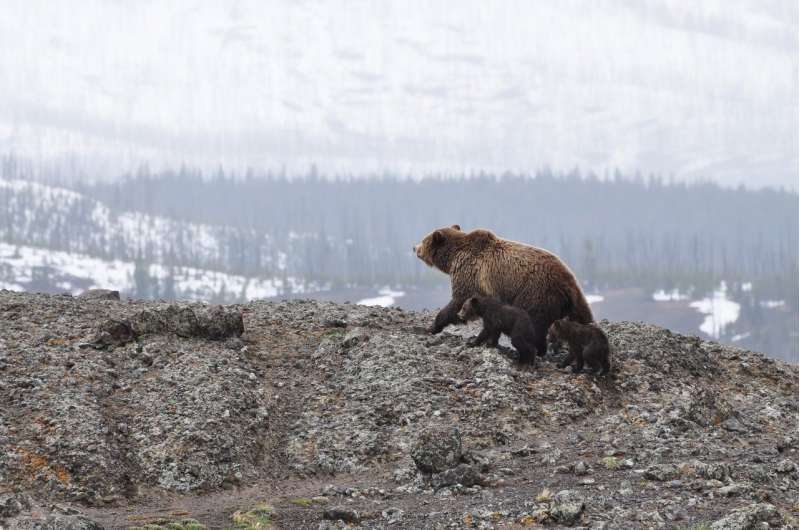Bears not bothered by diet high in saturated fats

Campgrounds and cottages are getaways for humans. They are also locations where grizzly bears are acquiring appetites for human foods that are high in saturated fats. Diets high in saturated fats are associated with many diseases in humans. Does the health of a bear suffer too?
A new study published today in the Canadian Journal of Zoology found that captive bears fed a diet high in saturated fats and low in "healthy" polyunsaturated fats did not show symptoms of disease typically observed in humans eating foods high in saturated fats such as insulin resistance, a precursor to type 2 diabetes.
Researchers from Washington State University (WSU) fed adult bears one of two diets prior to hibernation, one high in polyunsaturated fats with oats and salmon and the other high in saturated fats containing beef and cheese. The bears fed from May to the end of October and then hibernated over winter. In spring when they woke it was time for a health check-up.
Bears fed the diet high in saturated fats got a relatively clean bill of health—their cholesterol and insulin levels were the same as the bears that ate the diet high in healthy fats.
But evidence of mild inflammation and heart strain in the bears fed the diet high in saturated fats raises questions about the health of bears in the wild that feed on human refuse their entire lives.
"While [grizzly] bears were relatively resistant to developing severe metabolic imbalances or overt clinical disease due to a high saturated fat diet, it is important to note that this study occurred only over a single feeding season," says Danielle Rivet, who led the study during her graduate studies at WSU. The heart and inflammation abnormalities detected "could manifest into objective symptoms of disease (i.e., insulin resistance, high cholesterol, or chronic hypertension) in bears relying heavily on human refuse or bears in captive facilities over a longer term."
In autumn, bears "feed voraciously" building up body fat that they will metabolize and survive on throughout winter hibernation. Bears can accumulate 30-40% body fat, percentages considered "obese or morbidly obese" by human standards. "Obesity as defined by human standards may be healthy or even necessary for this species to thrive and reproduce," says Rivet. Still, Rivet suggests that "certain types of fats may be better or healthier than others" for foraging bears.
Rivet recommends that the "availability of human refuse in natural areas inhabited by bears should be eliminated for bear, as well as human, health and safety," adding that, "diets of captive [bears] should be carefully selected to avoid high saturated [fat] content."
The article, "Systemic effects of a high saturated fat diet in grizzly bears (Ursus arctos horribilis)" by Danielle Rivet, Lynne Nelson, Chantal Vella, Heiko Jansen, and Charles Robbins was published today in the Canadian Journal of Zoology.
More information: D.R. Rivet et al, Systemic effects of a high saturated fat diet in grizzly bears (Ursus arctos horribilis), Canadian Journal of Zoology (2017). DOI: 10.1139/cjz-2016-0271
Provided by Canadian Science Publishing (NRC Research Press)




















